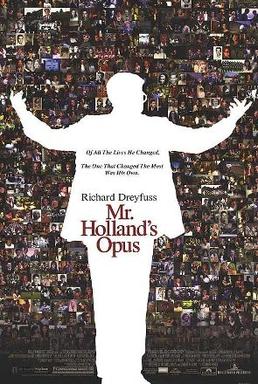Mr. Holland's Opus
Mr. Holland's Opus is a 1995 American drama film directed by Stephen Herek, produced by Ted Field, Robert W. Cort, and Michael Nolin, and written by Patrick Sheane Duncan. The film stars Richard Dreyfuss in the title role of Glenn Holland, a dedicated high-school music teacher who attempts to compose his own music while struggling to balance his job and life with his wife and profoundly deaf son. The cast also includes Glenne Headly, Olympia Dukakis, William H. Macy, and Jay Thomas.
The film was nominated for the Golden Globe Award for Best Screenplay. Richard Dreyfuss received nominations for the Golden Globe Award for Best Actor – Motion Picture Drama and the Academy Award for Best Actor.
Plot
In the fall of 1964, 30-year-old Glenn Holland, a successful and talented musician and composer from Portland, Oregon. He switches gears, taking a position as a music teacher at John F. Kennedy High School so that he can spend more time with his young wife, Iris, and work on his symphony. The film covers his 30-year teaching career, set amongst the changes in American society.
Holland at first struggles in his new job but learns how to connect with his students by using rock and roll and other popular music to convince them that music is a fun and worthwhile pursuit. He becomes a popular teacher at the school and rises to the task of creating a school marching band with help from the football coach, Bill Meister, with whom he becomes lifelong friends. Holland persuades principal Helen Jacobs to maintain funding for the school's arts programs, despite a shrinking budget and the objections of vice principal Gene Wolters.
The time Holland devotes to his classes, the marching band, orchestra, productions, and mentoring both struggling and talented students leave him little time to work on his symphony or to spend with his family. When his son, Cole, is found to be deaf, he is severely disappointed that he will never be able to share his love of music. He fails to learn American Sign Language properly, leaving him unable to communicate with his son and creating a rift between him and Iris, who has to raise Cole mostly by herself. As the years progress, Holland grows closer to his students at Kennedy High and more distant from his own son. An argument with his teenage son finally makes Holland realize the error of his ways, and he learns to communicate with his son and help him visualize the music he can't hear and repairs his relationship with his wife.
In 1995, Principal Wolters shut down the school's arts programs, citing further cuts from the Education Board and the need to prioritize reading, writing, and math, and Holland was laid off as a result. Holland makes an impassioned plea to the Board to no avail and becomes despondent, believing that his teaching career has amounted to nothing. On his last day, Holland's wife and son, now a teacher himself, help him clear out his office and take him to the auditorium. It is packed full of current and former students who greet him with a standing ovation. Gertrude Lang, a struggling clarinetist from Holland's first year teaching, who is now Governor of Oregon, gives a speech praising Mr. Holland, that his legacy is more than just the symphony; it is all the people he has helped and influenced over 30 years. She joins past members of the school's orchestra, who have been practicing the symphony on stage. Mr. Holland conducts them in its premiere performance.
Music
The film features an orchestral score by Michael Kamen and many pieces of classical music. Kamen also wrote An American Symphony ("Mr. Holland's Opus"), the work on which Mr. Holland is shown working throughout the movie. Kamen's arrangement won the 1997 Grammy for Best Instrumental Arrangement.
See also [ Movies with Impact ]
- More information is available at [ Wikipedia:Mr._Holland's_Opus ]
External links
- Review Mr. Holland's Opus at the Internet Movie Database
- Review Mr. Holland's Opus at the Turner Classic Movie Database
- Mr. Holland's Opus at All Movie Guide
Chat rooms • What links here • Copyright info • Contact information • Category:Root
